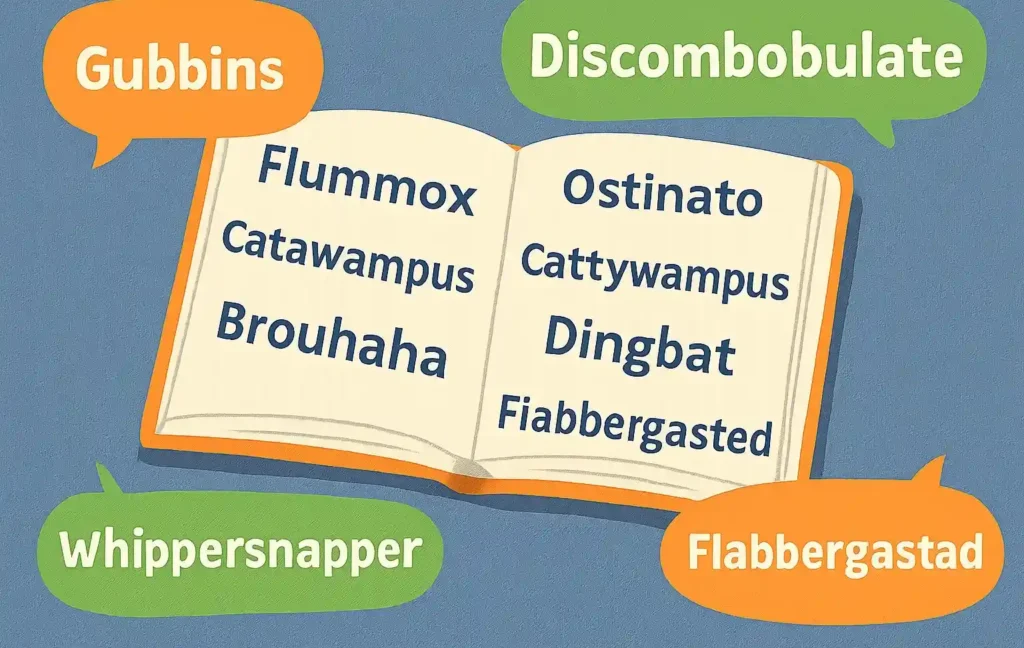I’ll be honest—English is a bit of a mess. It’s like a suitcase that’s been stuffed for centuries with scraps from Latin, Greek, French, German, and whoever else we bumped into along the way. That’s why we’ve ended up with words that look like dares, sound like jokes, or mean something so oddly specific you can’t imagine who needed them in the first place.
Some of these words have survived because word nerds adore them. Others just refuse to die, lurking in dictionaries like fossils that still get dusted off now and then. And a few? They feel like the language equivalent of Easter eggs—hidden treasures you stumble on and can’t resist showing off.
Let’s poke around at some of the strangest ones.

The Monster Words
Everyone knows English has some ridiculously long words, but they’re mostly there for flexing.
- Pneumonoultramicroscopicsilicovolcanoconiosis (say that three times fast) is a lung disease caused by inhaling fine silica dust. Doctors just call it silicosis—because who has the time?
- Floccinaucinihilipilification is another whopper. It means “the act of declaring something worthless,” and yes, it was invented by 18th-century students basically to show off. Imagine throwing it into an argument: “Your floccinaucinihilipilification of my Spotify playlist is unfair.”
- My personal favorite irony: hippopotomonstrosesquippedaliophobia—the fear of long words. Whoever coined it clearly had a dark sense of humor.
These are words less for everyday life, more for torturing spelling bee kids.
Words That Sound Fake (But Aren’t)
Sometimes you stumble across a word and think, No way that’s real. And yet…
- Bumfuzzle: means to confuse. “That math problem bumfuzzled me” works better than “confused me,” doesn’t it?
- Collywobbles: the nervous stomach flutters before a big moment. Still used in Britain.
- Flibbertigibbet: a chatterbox. Shakespeare used it, so it has pedigree.
- Snickersnee: not a candy bar, but an old term for a knife fight.
If Dr. Seuss had been a linguist, he probably would’ve made up the same list.
Words That Just Make You Laugh
Some words are funny simply because of how they feel in your mouth.
- Wabbit: a Scottish word for exhausted. “After that hike, I’m absolutely wabbit.”
- Brouhaha: a noisy fuss. It sounds exactly like what it describes.
- Lollygag: to waste time. Still my favorite insult disguised as advice: “Quit lollygagging.”
- Gobbledygook: nonsense jargon, often from politicians. Coined by a Texan congressman in the ’40s who was sick of bureaucratic mumbo-jumbo.
Old Words That Refuse to Retire
Some words hang around long after their prime, usually because they’re too good to let go.
- Nincompoop: an insult from the 1600s. Nobody knows exactly where it came from, but it’s still oddly satisfying to say.
- Cattywampus: crooked or askew. Southern U.S. slang with a twang.
- Whippersnapper: a cocky youngster. Half scold, half term of endearment.
They may sound outdated, but they’ve got more character than half our modern slang.
Science, or Just Plain Silly?
Science doesn’t escape the weirdness either.
- Bumbershoot: old-timey American for “umbrella.” It feels like it belongs in a children’s book.
- Gardyloo: what folks in medieval Edinburgh yelled before dumping waste water into the street. Translation: “Heads up, it’s about to get gross.”
- Nudiustertian: “the day before yesterday.” Overly specific, completely unnecessary, and yet—kind of brilliant.
Why Do These Words Survive?
Honestly? Because we love them. They add color to a conversation in a way plain words don’t. Saying you’re “tired” is boring. Saying you’re “wabbit” makes people pause and smile. Writers, trivia nerds, and language enthusiasts keep these relics alive, if only for the joy of it.
Language isn’t supposed to be neat or efficient—it’s messy, playful, and constantly evolving. That’s why weird words stick.
The Takeaway
Next time you’re tempted to complain about English being inconsistent, remember: the chaos is half the fun. Where else can you describe confusion as being bumfuzzled, or call someone a flibbertigibbet with a straight face?
English is weird. Let’s keep it that way.
Nalin Ketekumbura shares trending stories, viral updates, and lifestyle insights with a fresh, engaging voice. As the mind behind News2Era, he delivers reliable, fast, and captivating content that connects with readers worldwide. Passionate about storytelling, Nalin explores culture, entertainment, and everyday moments to keep audiences informed and inspired.